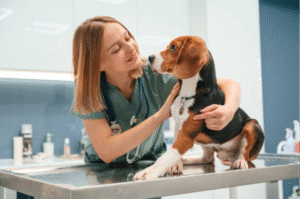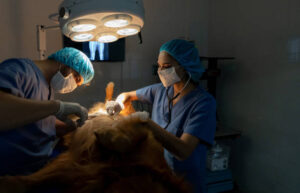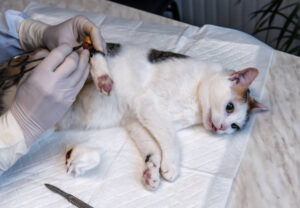Laboratory testing is a cornerstone of preventive veterinary care and early disease detection. At our Renton animal clinic we believe in empowering pet owners with clear insight into what lab results reveal and why they matter. Understanding your pet’s lab results enables you to partner with your veterinarian for accurate diagnosis and informed treatment decisions.
Why Lab Tests Are Crucial for Your Pet’s Health
Laboratory testing offers a deep look into your pet’s inner well-being that physical exams alone can’t provide. It can uncover hidden conditions early on, monitor ongoing diseases, and guide effective treatment decisions.
The Role of Diagnostic Testing in Veterinary Care
Veterinary diagnostic testing helps detect illness before symptoms appear, monitor chronic diseases like kidney or liver disorders, and ensure treatments or surgeries are safe.
When and Why Lab Tests Are Recommended
- Annual wellness exams—especially for pets over five years.
• Before anesthesia, surgery or dental procedures.
• If symptoms such as lethargy, weight loss, vomiting or changes in appetite appear.
• For chronic conditions—like diabetes or endocrine disorders—for routine monitoring.
Overview of Common Pet Lab Tests
Pets require a range of tests to properly assess health, detect early disease, and guide care. Below is a breakdown of the most common lab tests and their diagnostic roles.
Blood Work (CBC & Chemistry Panel)
- Complete Blood Count (CBC): Evaluates red and white blood cells, hemoglobin, hematocrit and platelets—to detect anemia, infection or inflammation.
• Chemistry Panel: Measures liver enzymes (ALT, ALP), kidney function markers (BUN, creatinine), electrolytes, glucose and proteins to assess organ health and detect metabolic issues.
Urinalysis
Evaluates kidney function, hydration, urinary tract infections, bladder stones or crystals, and indicators of systemic diseases such as diabetes via specific gravity, pH, protein, glucose and sediment analysis.
Fecal Testing
Used to screen for intestinal parasites, protozoal pathogens, gastrointestinal infections or malabsorption. Common for puppies, kittens and newly rescued pets.
Hormone and Endocrine Tests
Includes T4 for thyroid function, cortisol and ACTH stimulation tests for Cushing’s disease, insulin monitoring for diabetes, and other hormone assays for endocrine disorders.
Imaging Support Tests (X‑rays, Ultrasounds)
These tests complement lab findings by offering structural views of organs. Animal ultrasound provides live visualization of liver, spleen, kidneys, bladder and GI tract to confirm diagnoses.
Interpreting Your Pet’s Lab Results
Facing a page of numbers can feel overwhelming. Here’s how pet owners can gain clarity.
Normal vs. Abnormal Ranges
Lab results include:
• A reference interval indicating the range for healthy pets.
• Your pet’s measured values.
Values outside normal ranges may indicate potential concern, but age, breed, hydration level and medications can affect interpretation.
How Vets Read Lab Results
Veterinarians evaluate patterns rather than individual values:
• Elevated ALT + bilirubin changes = possible liver problems.
• High BUN and creatinine = kidney function issues.
• Low hematocrit + iron = anemia, possibly from chronic disease or bleeding.
• Proteinuria + specific gravity changes = kidney disease vs. urinary tract infection.
Key Indicators to Watch For
- Elevated liver enzymes (ALT, ALP)
• Progressive rise in kidney markers (BUN, creatinine, SDMA)
• Electrolyte shifts (sodium, potassium, calcium) relevant in endocrine disorders
• High glucose or ketones—suggesting diabetes or poor control
Veterinary Testing at Happy Tails Animal Hospital, Renton
At Happy Tails Animal Hospital in Renton, we are dedicated to providing fast, accurate and compassionate diagnostic services so pet owners get results—and guidance—quickly.
In‑House vs. External Labs: What’s the Difference?
- In‑house labs offer same‑day results on CBCs, chemistry, urinalysis, ideal for urgent assessments.
• External reference labs handle complex diagnostics like endocrine panels, infectious disease titers or genetic testing; results within 1–3 days.
Our Diagnostic Workflow
- Initial physical exam and medical history
- Sample collection: blood, urine, feces
- In‑house analysis or sending to reference lab depending on needs
- Veterinarian reviews results and correlates with clinical findings
- Team discusses results, treatment options and follow‑up with you
Turnaround Times & Accuracy Standards
| Test Type | Purpose | Turnaround Time |
| CBC & Chemistry Panel | Check for infection, anemia, organ health | 24–48 hrs or same day in‑house |
| Urinalysis | Kidney function, UTIs, urinary health | Same day in‑house |
| Fecal Exam | Parasites, GI issues | 24–48 hrs |
| Hormone Panels | Diagnose endocrine disorders | 1–3 days via reference lab |
| Ultrasound | Internal organ imaging and structure | Immediate with imaging follow‑up |
This process ensures timely, precise data to inform pet health decisions.
How Pet Owners Can Prepare for Lab Testing
Preparation leads to smoother appointments, less stress for pets, and more reliable test results.
Fasting Guidelines
- For chemistry panels that assess glucose and metabolism, fasting for 8–12 hours is ideal (overnight fast). Water is permitted.
• Urine and fecal tests typically require no fasting.
Reducing Stress Before the Visit
- Bring familiar items such as toys or blankets to comfort your pet.
• Provide light exercise before leaving to help ease anxiety.
• Keep car travel calm and environment quiet wherever possible.
What to Bring and Expect
- Bring prior medical records or results if available.
• Expect a 15–30 minute appointment for sample collection.
• Ask your veterinarian to review and explain any values or trends on your pet’s lab report.
Common Concerns and Questions About Pet Lab Tests
Here are answers to common questions and misconceptions about veterinary lab services.
Are Lab Tests Painful for Pets?
- Blood draw uses a small-gauge needle similar to vaccination discomfort. Most pets tolerate this well.
• Urine collection is non-invasive (free-catch or catheter).
• Sedation is rarely necessary-used only if a pet is particularly anxious or difficult.
How Often Should Lab Work Be Done?
- Young, healthy pets: yearly wellness screening starting at age one.
• Senior pets (7+ years): wellness panel twice a year may be recommended.
• Pets with chronic conditions: tests every 3–6 months or per veterinarian’s advice.
What If Results Show Something Abnormal?
- Vets may repeat tests or perform confirmatory diagnostics.
• Imaging (e.g. ultrasound, X-ray) may be recommended.
• Treatment plans may include diet modifications, medications, or referrals to specialists.
Insurance & Cost Considerations
- Typical costs: CBC + chemistry panel $100–$200; urinalysis $50–$100; hormone panels and specialized tests may cost more.
• Pet insurance may cover diagnostic testing, depending on plan.
• Payment options and financial guidance are always available—just ask us.
Additional Diagnostic Services We Offer
In addition to standard lab work, Happy Tails offers advanced diagnostic tools for comprehensive pet care.
Digital X‑Rays
Our digital radiography allows immediate, high-resolution views of bones, lungs, heart, abdomen, and potential masses or foreign bodies.
Ultrasound Imaging
Ultrasound imaging provides live internal views of organs, assisting in identifying masses, fluid pockets, tissue patterns and guiding biopsies or targeted treatment. Often performed alongside blood and urine diagnostics, animal ultrasound near me is an essential tool for advanced diagnostics at Happy Tails Animal Hospital.
Referral‑Based Advanced Lab Testing
For rare or complex conditions such as infectious diseases, genetic tests or veterinary cytology we collaborate with certified specialists and reference labs for the most accurate diagnostics available.
Conclusion: Proactive Health Through Lab Testing
Understanding your pet’s lab results empowers you to take proactive steps for early detection, effective chronic disease management, and informed veterinary care. At our Renton animal clinic we emphasize transparency, education, and personalized diagnostics. From routine blood and urine screening to advanced ultrasound imaging and hormonal evaluations, our team provides clear interpretations and compassionate support every step of the way.
To discuss your pet’s diagnostic needs or schedule testing, please visit our Contact Us page. Empower yourself with knowledge for your pet’s best health and well‑being.
FAQs About Pet Lab Testing
- How long does it take to get my pet’s lab results?
Urinalysis is often same day. CBC and chemistry panels usually take 24–48 hours. Hormone or specialized tests take 1–3 days. Imaging results are shared immediately during your appointment. - Can I request a copy of the lab report?
Absolutely. We provide digital or printed copies of lab reports and thoroughly explain any abnormal or notable values. - How accurate are in‑house veterinary lab tests?
Our in‑house lab meets high standards for sensitivity and specificity. Should advanced precision be necessary, samples are sent to accredited reference labs. - Do I need to fast my pet before a blood test?
Yes, for accurate glucose and metabolic panels, an 8–12 hour fast is recommended. Water is allowed. There’s no need to fast for urine or fecal tests. - What do abnormal lab values mean?
Abnormal lab values indicate potential concerns but are not definitive diagnoses. They guide further diagnostics, dietary changes or treatment plans in consultation with your veterinarian.





